An Analysis of Motivational Theories Applied by Tesco's HRM
VerifiedAdded on 2021/04/24
|12
|1984
|74
Report
AI Summary
This report provides an in-depth analysis of Tesco's international human resource management practices, focusing on the application of various motivational theories to enhance employee performance and satisfaction. It begins with an introduction to the importance of human resources in modern business and the strategies employed by organizations like Tesco to motivate their workforce. The report then delves into specific motivational theories endorsed by Tesco, including the Mayo Effect, Taylor's theory, and the frameworks of Maslow and Herzberg. It examines how Tesco implements these theories through various initiatives such as work-life balance policies, award programs, training and development opportunities, and employee surveys. The report highlights the practical application of these theories within Tesco's organizational structure and culture, demonstrating how the company strives to create a positive and productive work environment for its employees. The conclusion summarizes the effectiveness of Tesco's motivational strategies and their impact on the company's success as a leading employer. The report also includes a detailed list of references used for research.
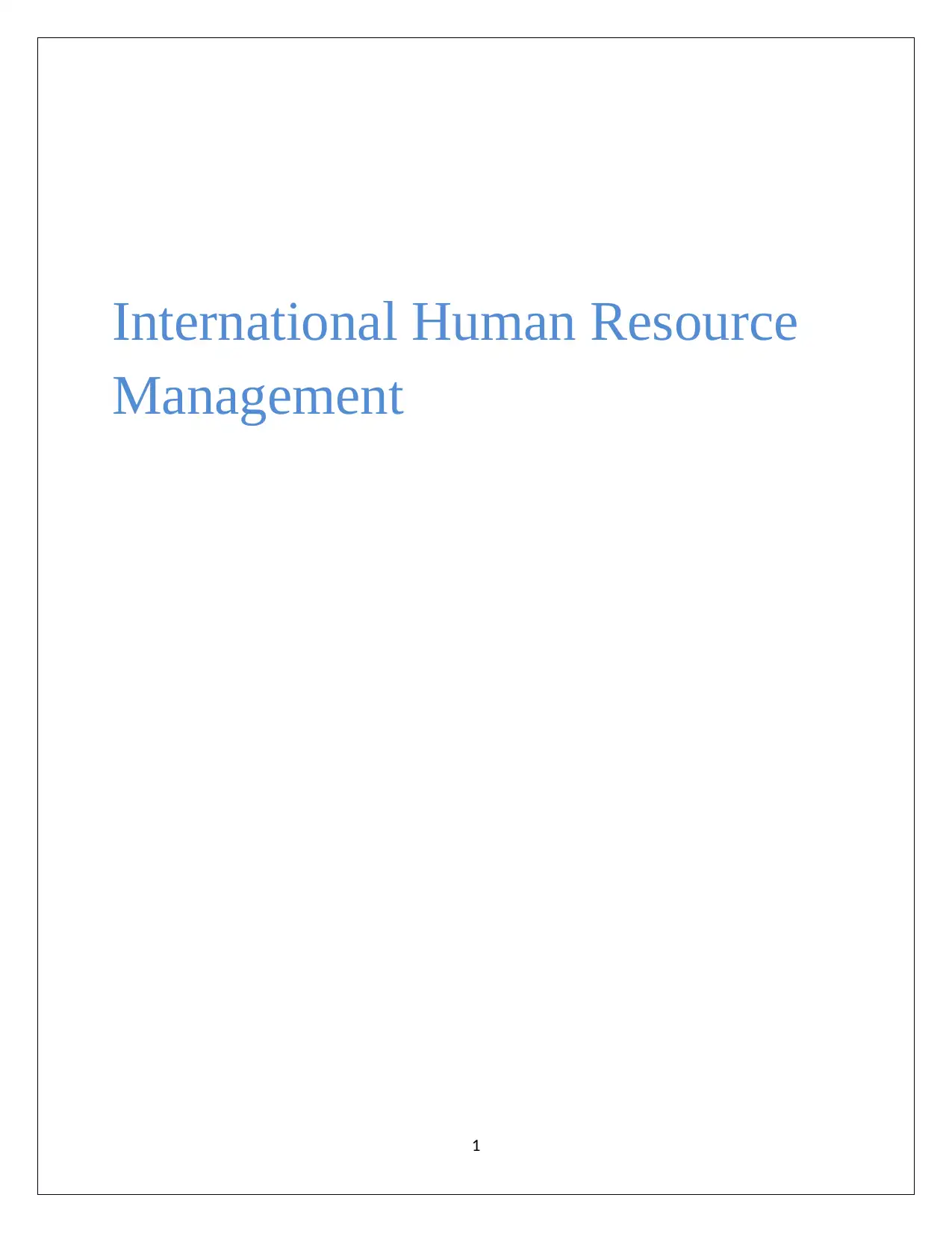
International Human Resource
Management
1
Management
1
Paraphrase This Document
Need a fresh take? Get an instant paraphrase of this document with our AI Paraphraser
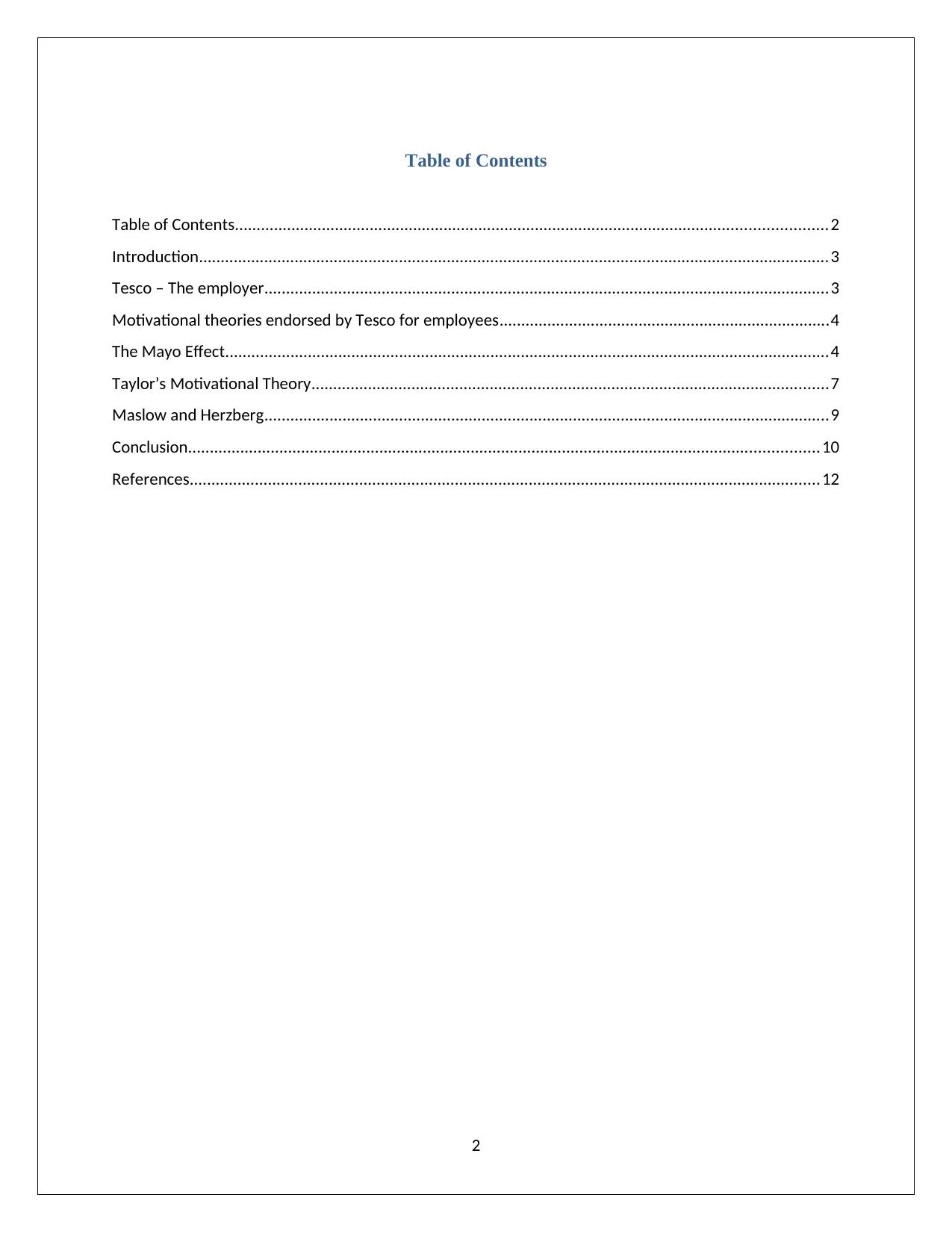
Table of Contents
Table of Contents........................................................................................................................................2
Introduction.................................................................................................................................................3
Tesco – The employer..................................................................................................................................3
Motivational theories endorsed by Tesco for employees............................................................................4
The Mayo Effect...........................................................................................................................................4
Taylor’s Motivational Theory.......................................................................................................................7
Maslow and Herzberg..................................................................................................................................9
Conclusion.................................................................................................................................................10
References.................................................................................................................................................12
2
Table of Contents........................................................................................................................................2
Introduction.................................................................................................................................................3
Tesco – The employer..................................................................................................................................3
Motivational theories endorsed by Tesco for employees............................................................................4
The Mayo Effect...........................................................................................................................................4
Taylor’s Motivational Theory.......................................................................................................................7
Maslow and Herzberg..................................................................................................................................9
Conclusion.................................................................................................................................................10
References.................................................................................................................................................12
2
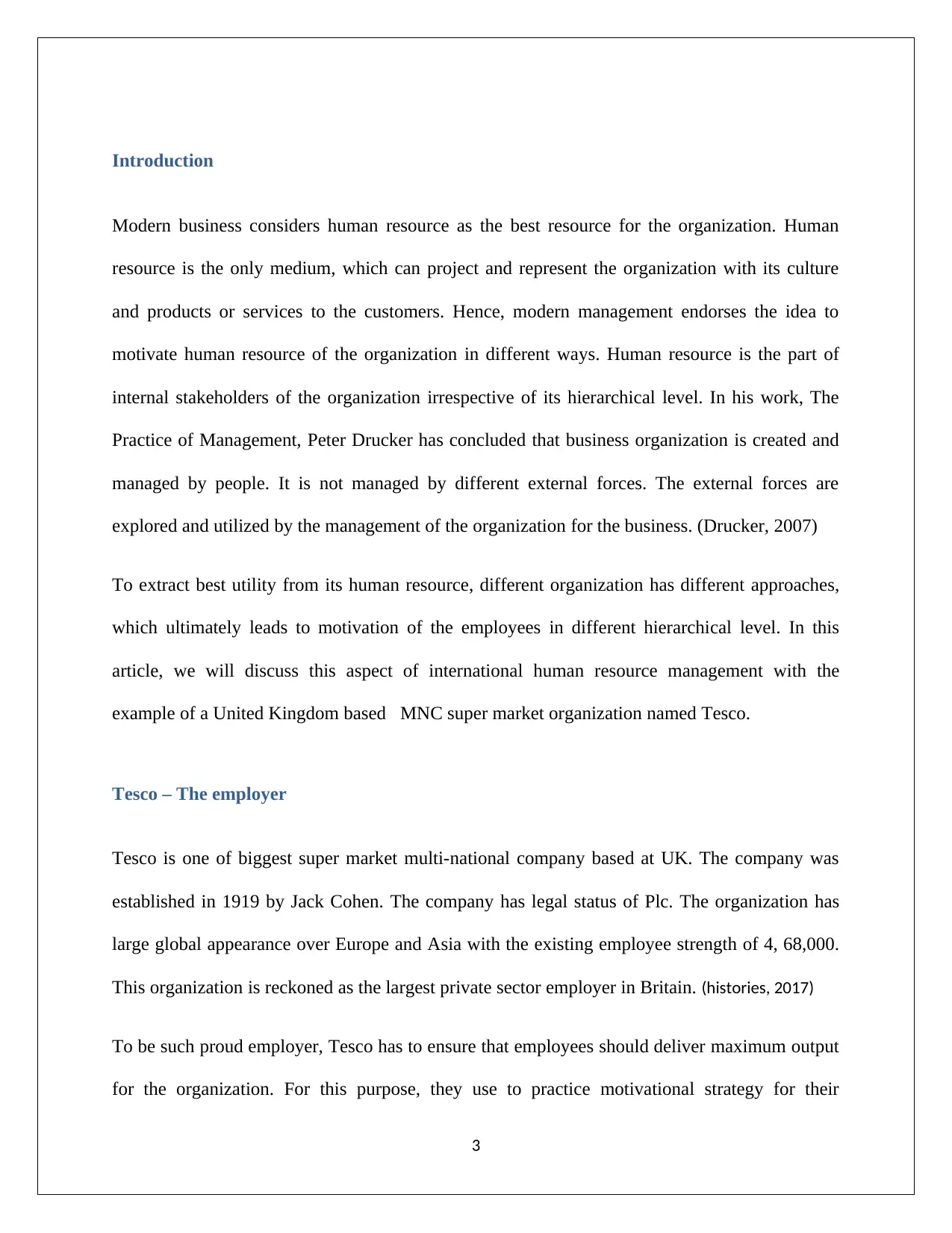
Introduction
Modern business considers human resource as the best resource for the organization. Human
resource is the only medium, which can project and represent the organization with its culture
and products or services to the customers. Hence, modern management endorses the idea to
motivate human resource of the organization in different ways. Human resource is the part of
internal stakeholders of the organization irrespective of its hierarchical level. In his work, The
Practice of Management, Peter Drucker has concluded that business organization is created and
managed by people. It is not managed by different external forces. The external forces are
explored and utilized by the management of the organization for the business. (Drucker, 2007)
To extract best utility from its human resource, different organization has different approaches,
which ultimately leads to motivation of the employees in different hierarchical level. In this
article, we will discuss this aspect of international human resource management with the
example of a United Kingdom based MNC super market organization named Tesco.
Tesco – The employer
Tesco is one of biggest super market multi-national company based at UK. The company was
established in 1919 by Jack Cohen. The company has legal status of Plc. The organization has
large global appearance over Europe and Asia with the existing employee strength of 4, 68,000.
This organization is reckoned as the largest private sector employer in Britain. (histories, 2017)
To be such proud employer, Tesco has to ensure that employees should deliver maximum output
for the organization. For this purpose, they use to practice motivational strategy for their
3
Modern business considers human resource as the best resource for the organization. Human
resource is the only medium, which can project and represent the organization with its culture
and products or services to the customers. Hence, modern management endorses the idea to
motivate human resource of the organization in different ways. Human resource is the part of
internal stakeholders of the organization irrespective of its hierarchical level. In his work, The
Practice of Management, Peter Drucker has concluded that business organization is created and
managed by people. It is not managed by different external forces. The external forces are
explored and utilized by the management of the organization for the business. (Drucker, 2007)
To extract best utility from its human resource, different organization has different approaches,
which ultimately leads to motivation of the employees in different hierarchical level. In this
article, we will discuss this aspect of international human resource management with the
example of a United Kingdom based MNC super market organization named Tesco.
Tesco – The employer
Tesco is one of biggest super market multi-national company based at UK. The company was
established in 1919 by Jack Cohen. The company has legal status of Plc. The organization has
large global appearance over Europe and Asia with the existing employee strength of 4, 68,000.
This organization is reckoned as the largest private sector employer in Britain. (histories, 2017)
To be such proud employer, Tesco has to ensure that employees should deliver maximum output
for the organization. For this purpose, they use to practice motivational strategy for their
3
⊘ This is a preview!⊘
Do you want full access?
Subscribe today to unlock all pages.

Trusted by 1+ million students worldwide
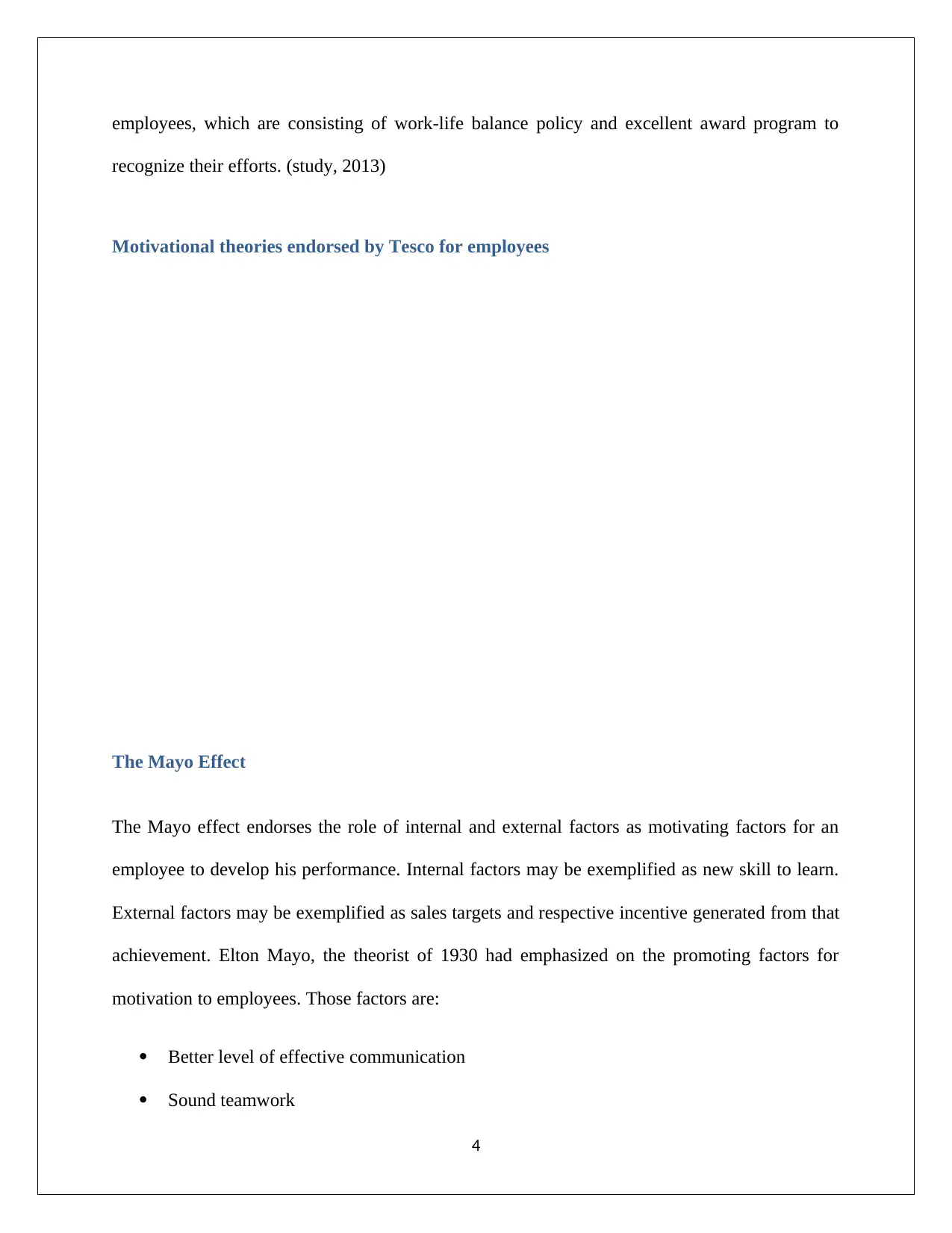
employees, which are consisting of work-life balance policy and excellent award program to
recognize their efforts. (study, 2013)
Motivational theories endorsed by Tesco for employees
The Mayo Effect
The Mayo effect endorses the role of internal and external factors as motivating factors for an
employee to develop his performance. Internal factors may be exemplified as new skill to learn.
External factors may be exemplified as sales targets and respective incentive generated from that
achievement. Elton Mayo, the theorist of 1930 had emphasized on the promoting factors for
motivation to employees. Those factors are:
Better level of effective communication
Sound teamwork
4
recognize their efforts. (study, 2013)
Motivational theories endorsed by Tesco for employees
The Mayo Effect
The Mayo effect endorses the role of internal and external factors as motivating factors for an
employee to develop his performance. Internal factors may be exemplified as new skill to learn.
External factors may be exemplified as sales targets and respective incentive generated from that
achievement. Elton Mayo, the theorist of 1930 had emphasized on the promoting factors for
motivation to employees. Those factors are:
Better level of effective communication
Sound teamwork
4
Paraphrase This Document
Need a fresh take? Get an instant paraphrase of this document with our AI Paraphraser
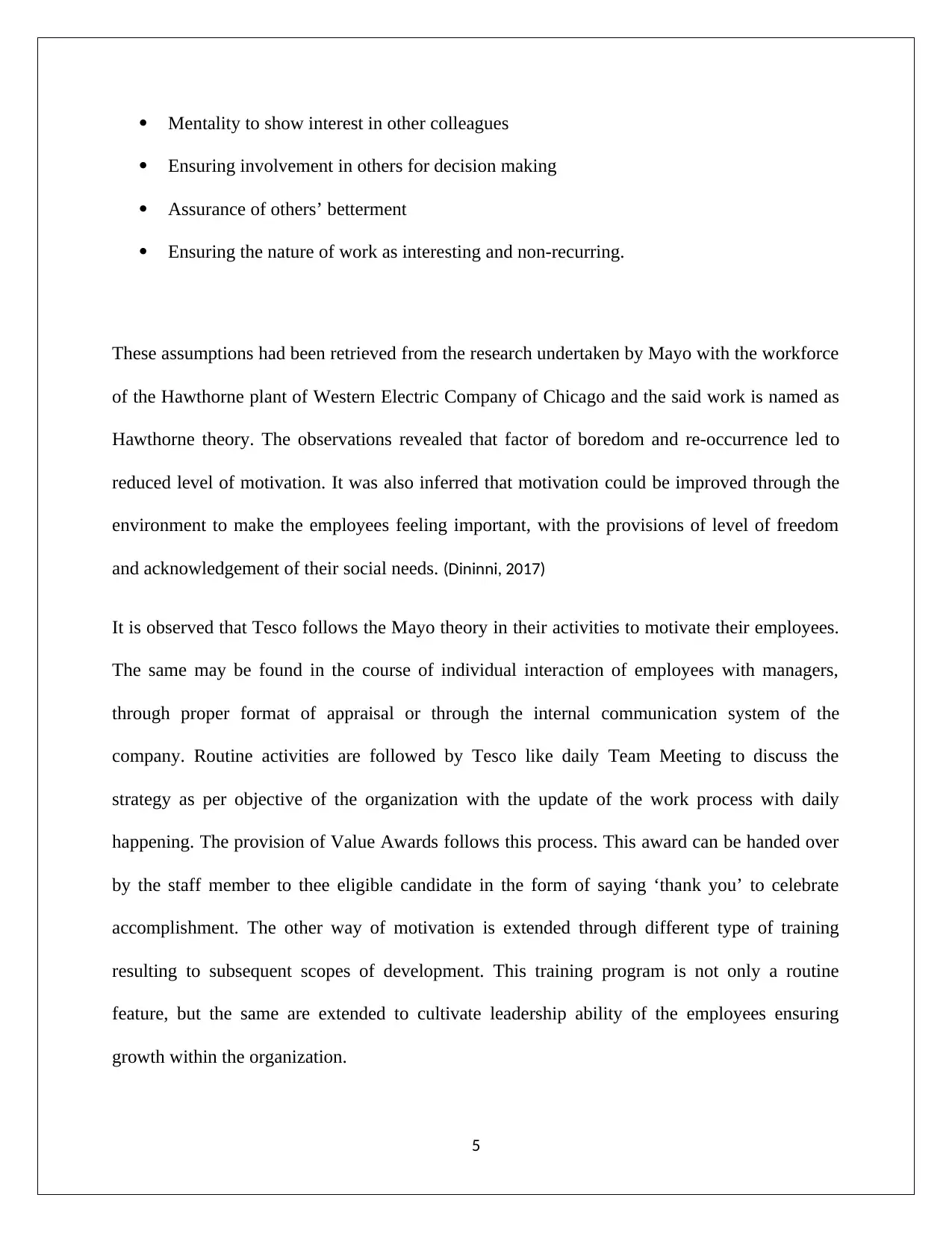
Mentality to show interest in other colleagues
Ensuring involvement in others for decision making
Assurance of others’ betterment
Ensuring the nature of work as interesting and non-recurring.
These assumptions had been retrieved from the research undertaken by Mayo with the workforce
of the Hawthorne plant of Western Electric Company of Chicago and the said work is named as
Hawthorne theory. The observations revealed that factor of boredom and re-occurrence led to
reduced level of motivation. It was also inferred that motivation could be improved through the
environment to make the employees feeling important, with the provisions of level of freedom
and acknowledgement of their social needs. (Dininni, 2017)
It is observed that Tesco follows the Mayo theory in their activities to motivate their employees.
The same may be found in the course of individual interaction of employees with managers,
through proper format of appraisal or through the internal communication system of the
company. Routine activities are followed by Tesco like daily Team Meeting to discuss the
strategy as per objective of the organization with the update of the work process with daily
happening. The provision of Value Awards follows this process. This award can be handed over
by the staff member to thee eligible candidate in the form of saying ‘thank you’ to celebrate
accomplishment. The other way of motivation is extended through different type of training
resulting to subsequent scopes of development. This training program is not only a routine
feature, but the same are extended to cultivate leadership ability of the employees ensuring
growth within the organization.
5
Ensuring involvement in others for decision making
Assurance of others’ betterment
Ensuring the nature of work as interesting and non-recurring.
These assumptions had been retrieved from the research undertaken by Mayo with the workforce
of the Hawthorne plant of Western Electric Company of Chicago and the said work is named as
Hawthorne theory. The observations revealed that factor of boredom and re-occurrence led to
reduced level of motivation. It was also inferred that motivation could be improved through the
environment to make the employees feeling important, with the provisions of level of freedom
and acknowledgement of their social needs. (Dininni, 2017)
It is observed that Tesco follows the Mayo theory in their activities to motivate their employees.
The same may be found in the course of individual interaction of employees with managers,
through proper format of appraisal or through the internal communication system of the
company. Routine activities are followed by Tesco like daily Team Meeting to discuss the
strategy as per objective of the organization with the update of the work process with daily
happening. The provision of Value Awards follows this process. This award can be handed over
by the staff member to thee eligible candidate in the form of saying ‘thank you’ to celebrate
accomplishment. The other way of motivation is extended through different type of training
resulting to subsequent scopes of development. This training program is not only a routine
feature, but the same are extended to cultivate leadership ability of the employees ensuring
growth within the organization.
5
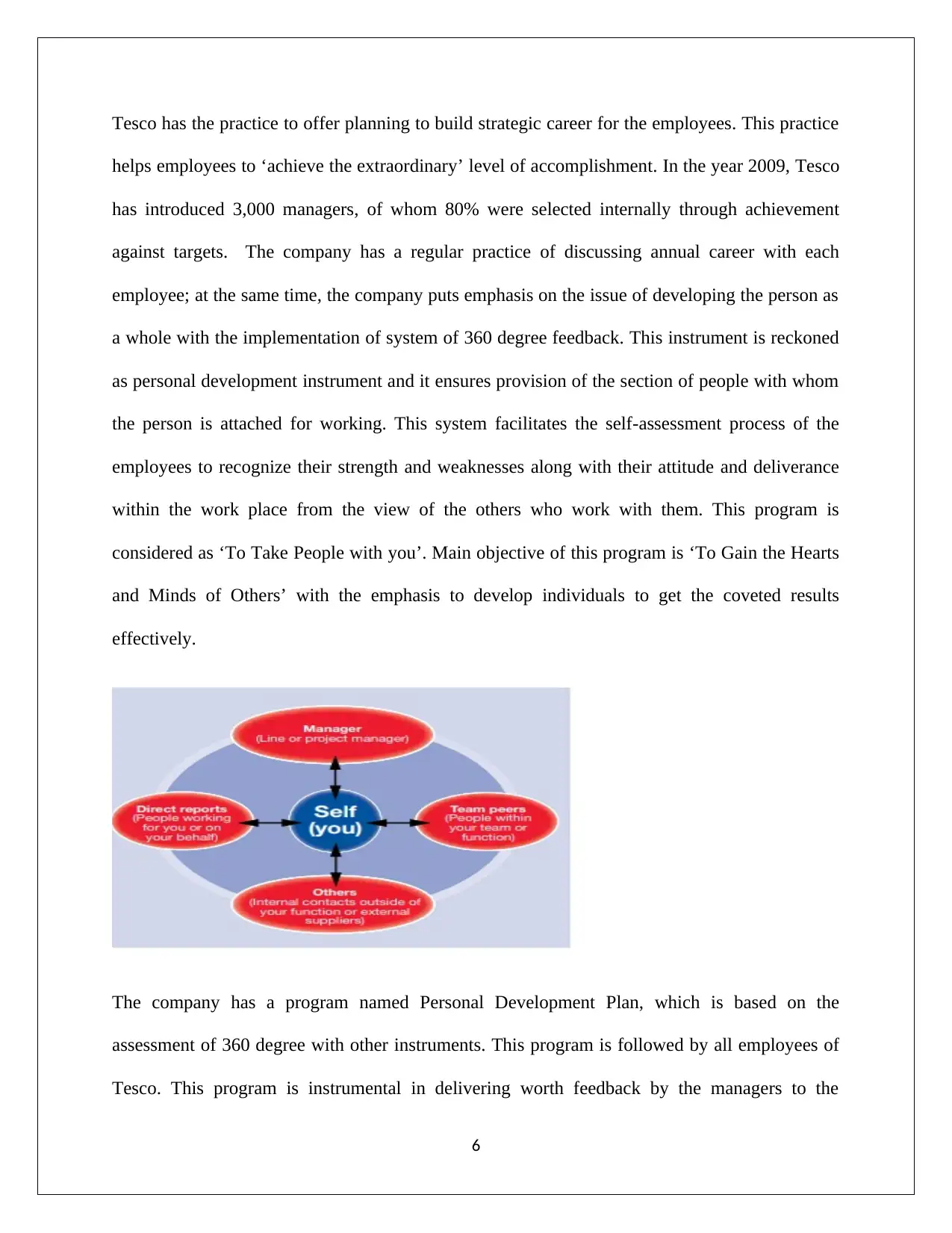
Tesco has the practice to offer planning to build strategic career for the employees. This practice
helps employees to ‘achieve the extraordinary’ level of accomplishment. In the year 2009, Tesco
has introduced 3,000 managers, of whom 80% were selected internally through achievement
against targets. The company has a regular practice of discussing annual career with each
employee; at the same time, the company puts emphasis on the issue of developing the person as
a whole with the implementation of system of 360 degree feedback. This instrument is reckoned
as personal development instrument and it ensures provision of the section of people with whom
the person is attached for working. This system facilitates the self-assessment process of the
employees to recognize their strength and weaknesses along with their attitude and deliverance
within the work place from the view of the others who work with them. This program is
considered as ‘To Take People with you’. Main objective of this program is ‘To Gain the Hearts
and Minds of Others’ with the emphasis to develop individuals to get the coveted results
effectively.
The company has a program named Personal Development Plan, which is based on the
assessment of 360 degree with other instruments. This program is followed by all employees of
Tesco. This program is instrumental in delivering worth feedback by the managers to the
6
helps employees to ‘achieve the extraordinary’ level of accomplishment. In the year 2009, Tesco
has introduced 3,000 managers, of whom 80% were selected internally through achievement
against targets. The company has a regular practice of discussing annual career with each
employee; at the same time, the company puts emphasis on the issue of developing the person as
a whole with the implementation of system of 360 degree feedback. This instrument is reckoned
as personal development instrument and it ensures provision of the section of people with whom
the person is attached for working. This system facilitates the self-assessment process of the
employees to recognize their strength and weaknesses along with their attitude and deliverance
within the work place from the view of the others who work with them. This program is
considered as ‘To Take People with you’. Main objective of this program is ‘To Gain the Hearts
and Minds of Others’ with the emphasis to develop individuals to get the coveted results
effectively.
The company has a program named Personal Development Plan, which is based on the
assessment of 360 degree with other instruments. This program is followed by all employees of
Tesco. This program is instrumental in delivering worth feedback by the managers to the
6
⊘ This is a preview!⊘
Do you want full access?
Subscribe today to unlock all pages.

Trusted by 1+ million students worldwide
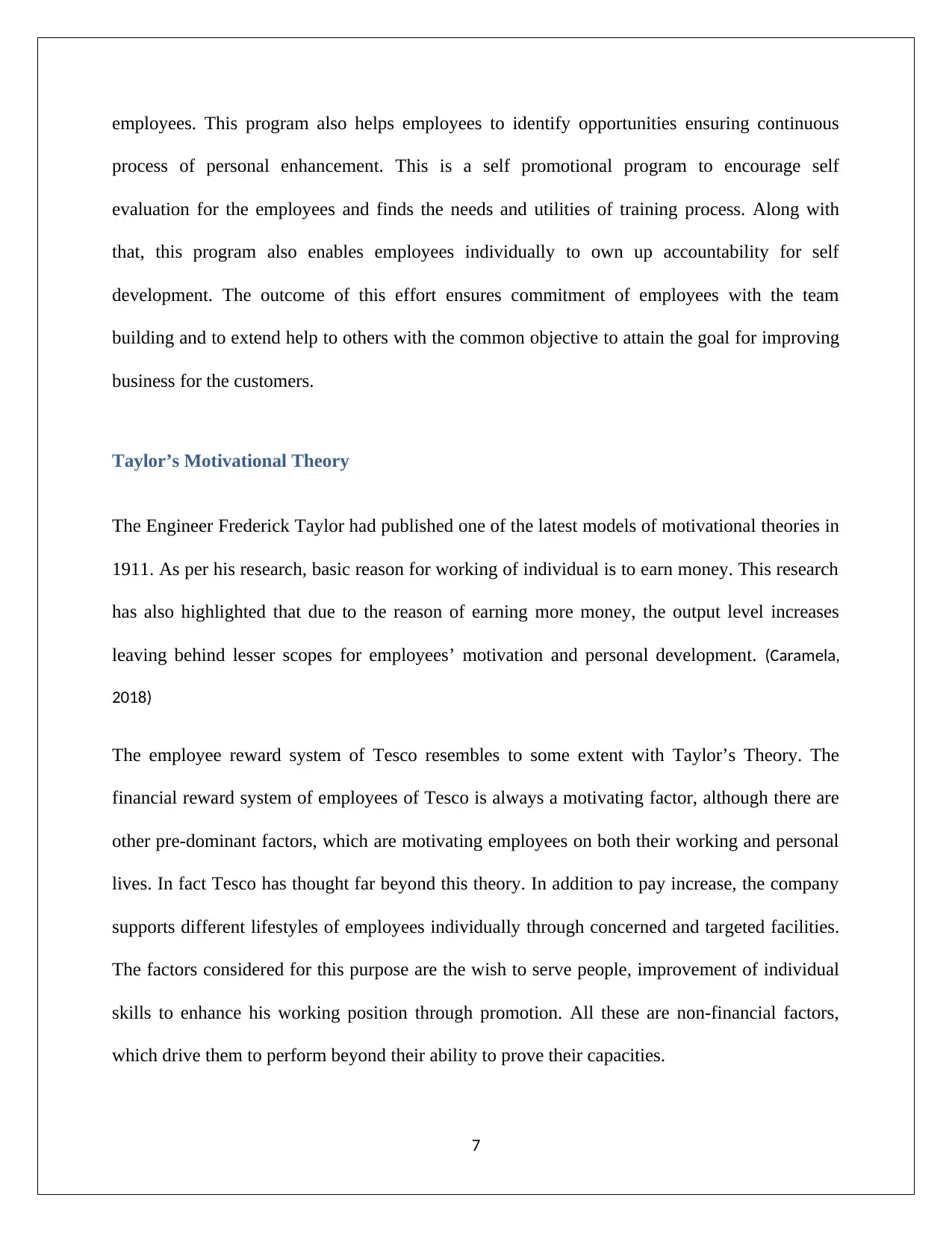
employees. This program also helps employees to identify opportunities ensuring continuous
process of personal enhancement. This is a self promotional program to encourage self
evaluation for the employees and finds the needs and utilities of training process. Along with
that, this program also enables employees individually to own up accountability for self
development. The outcome of this effort ensures commitment of employees with the team
building and to extend help to others with the common objective to attain the goal for improving
business for the customers.
Taylor’s Motivational Theory
The Engineer Frederick Taylor had published one of the latest models of motivational theories in
1911. As per his research, basic reason for working of individual is to earn money. This research
has also highlighted that due to the reason of earning more money, the output level increases
leaving behind lesser scopes for employees’ motivation and personal development. (Caramela,
2018)
The employee reward system of Tesco resembles to some extent with Taylor’s Theory. The
financial reward system of employees of Tesco is always a motivating factor, although there are
other pre-dominant factors, which are motivating employees on both their working and personal
lives. In fact Tesco has thought far beyond this theory. In addition to pay increase, the company
supports different lifestyles of employees individually through concerned and targeted facilities.
The factors considered for this purpose are the wish to serve people, improvement of individual
skills to enhance his working position through promotion. All these are non-financial factors,
which drive them to perform beyond their ability to prove their capacities.
7
process of personal enhancement. This is a self promotional program to encourage self
evaluation for the employees and finds the needs and utilities of training process. Along with
that, this program also enables employees individually to own up accountability for self
development. The outcome of this effort ensures commitment of employees with the team
building and to extend help to others with the common objective to attain the goal for improving
business for the customers.
Taylor’s Motivational Theory
The Engineer Frederick Taylor had published one of the latest models of motivational theories in
1911. As per his research, basic reason for working of individual is to earn money. This research
has also highlighted that due to the reason of earning more money, the output level increases
leaving behind lesser scopes for employees’ motivation and personal development. (Caramela,
2018)
The employee reward system of Tesco resembles to some extent with Taylor’s Theory. The
financial reward system of employees of Tesco is always a motivating factor, although there are
other pre-dominant factors, which are motivating employees on both their working and personal
lives. In fact Tesco has thought far beyond this theory. In addition to pay increase, the company
supports different lifestyles of employees individually through concerned and targeted facilities.
The factors considered for this purpose are the wish to serve people, improvement of individual
skills to enhance his working position through promotion. All these are non-financial factors,
which drive them to perform beyond their ability to prove their capacities.
7
Paraphrase This Document
Need a fresh take? Get an instant paraphrase of this document with our AI Paraphraser
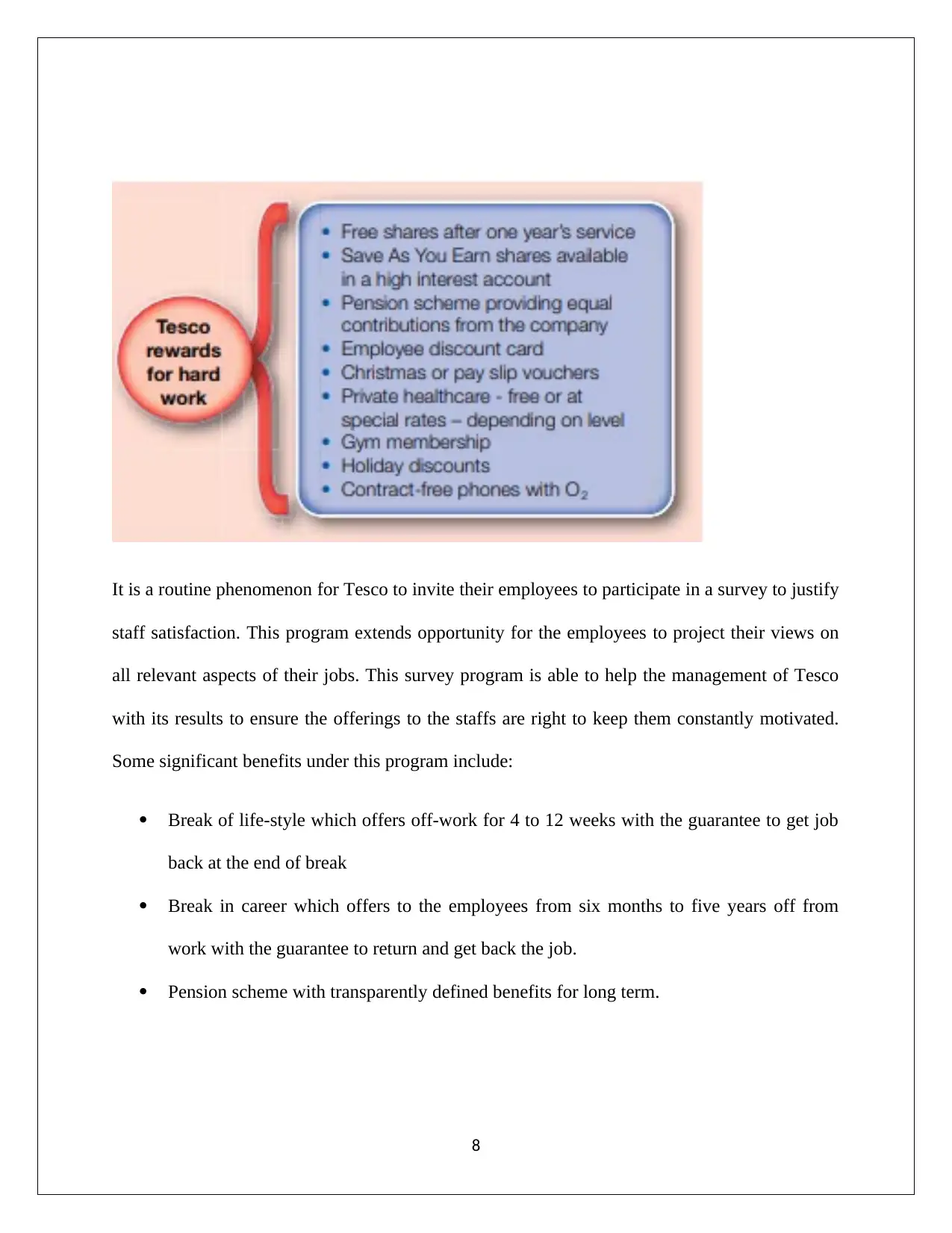
It is a routine phenomenon for Tesco to invite their employees to participate in a survey to justify
staff satisfaction. This program extends opportunity for the employees to project their views on
all relevant aspects of their jobs. This survey program is able to help the management of Tesco
with its results to ensure the offerings to the staffs are right to keep them constantly motivated.
Some significant benefits under this program include:
Break of life-style which offers off-work for 4 to 12 weeks with the guarantee to get job
back at the end of break
Break in career which offers to the employees from six months to five years off from
work with the guarantee to return and get back the job.
Pension scheme with transparently defined benefits for long term.
8
staff satisfaction. This program extends opportunity for the employees to project their views on
all relevant aspects of their jobs. This survey program is able to help the management of Tesco
with its results to ensure the offerings to the staffs are right to keep them constantly motivated.
Some significant benefits under this program include:
Break of life-style which offers off-work for 4 to 12 weeks with the guarantee to get job
back at the end of break
Break in career which offers to the employees from six months to five years off from
work with the guarantee to return and get back the job.
Pension scheme with transparently defined benefits for long term.
8
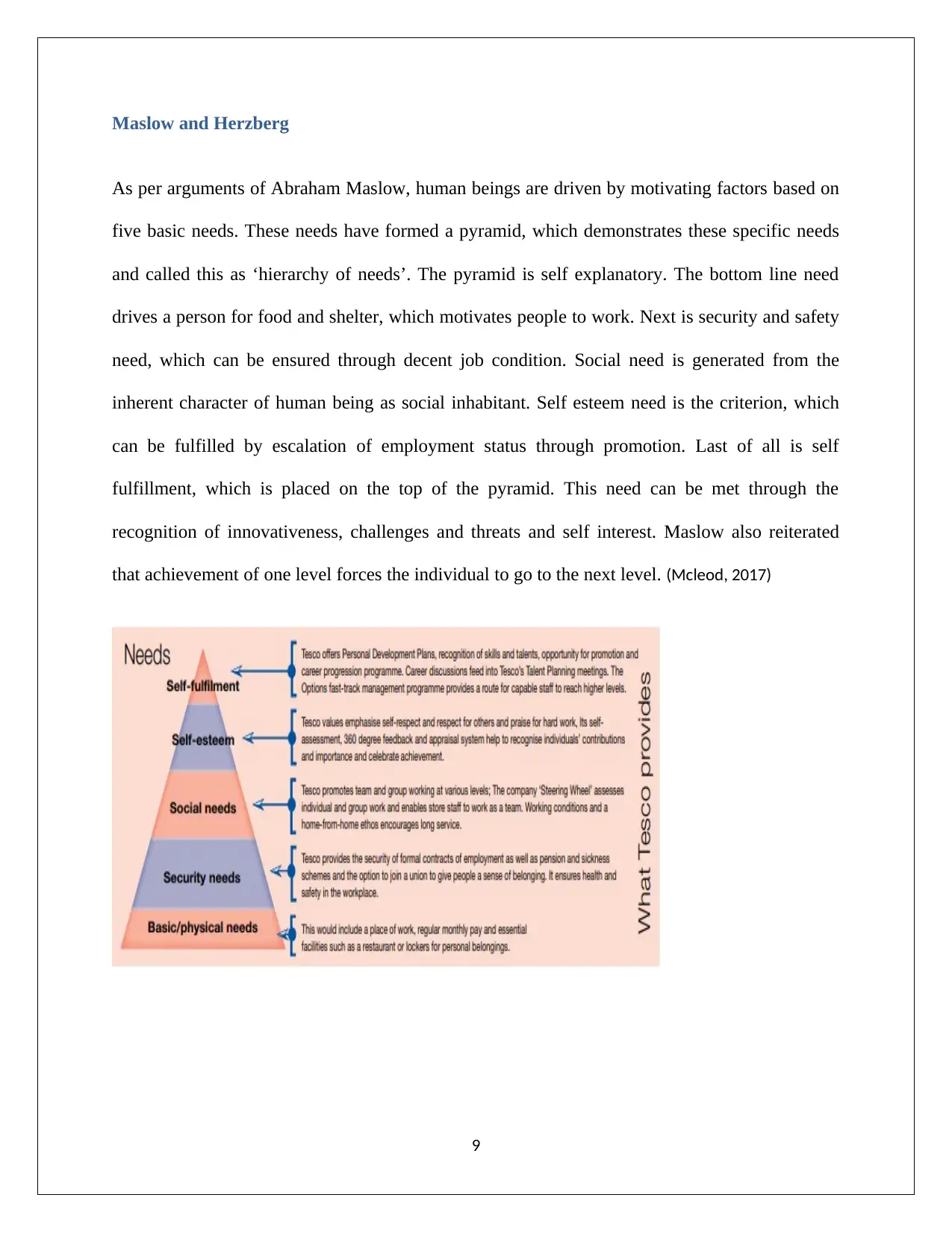
Maslow and Herzberg
As per arguments of Abraham Maslow, human beings are driven by motivating factors based on
five basic needs. These needs have formed a pyramid, which demonstrates these specific needs
and called this as ‘hierarchy of needs’. The pyramid is self explanatory. The bottom line need
drives a person for food and shelter, which motivates people to work. Next is security and safety
need, which can be ensured through decent job condition. Social need is generated from the
inherent character of human being as social inhabitant. Self esteem need is the criterion, which
can be fulfilled by escalation of employment status through promotion. Last of all is self
fulfillment, which is placed on the top of the pyramid. This need can be met through the
recognition of innovativeness, challenges and threats and self interest. Maslow also reiterated
that achievement of one level forces the individual to go to the next level. (Mcleod, 2017)
9
As per arguments of Abraham Maslow, human beings are driven by motivating factors based on
five basic needs. These needs have formed a pyramid, which demonstrates these specific needs
and called this as ‘hierarchy of needs’. The pyramid is self explanatory. The bottom line need
drives a person for food and shelter, which motivates people to work. Next is security and safety
need, which can be ensured through decent job condition. Social need is generated from the
inherent character of human being as social inhabitant. Self esteem need is the criterion, which
can be fulfilled by escalation of employment status through promotion. Last of all is self
fulfillment, which is placed on the top of the pyramid. This need can be met through the
recognition of innovativeness, challenges and threats and self interest. Maslow also reiterated
that achievement of one level forces the individual to go to the next level. (Mcleod, 2017)
9
⊘ This is a preview!⊘
Do you want full access?
Subscribe today to unlock all pages.

Trusted by 1+ million students worldwide
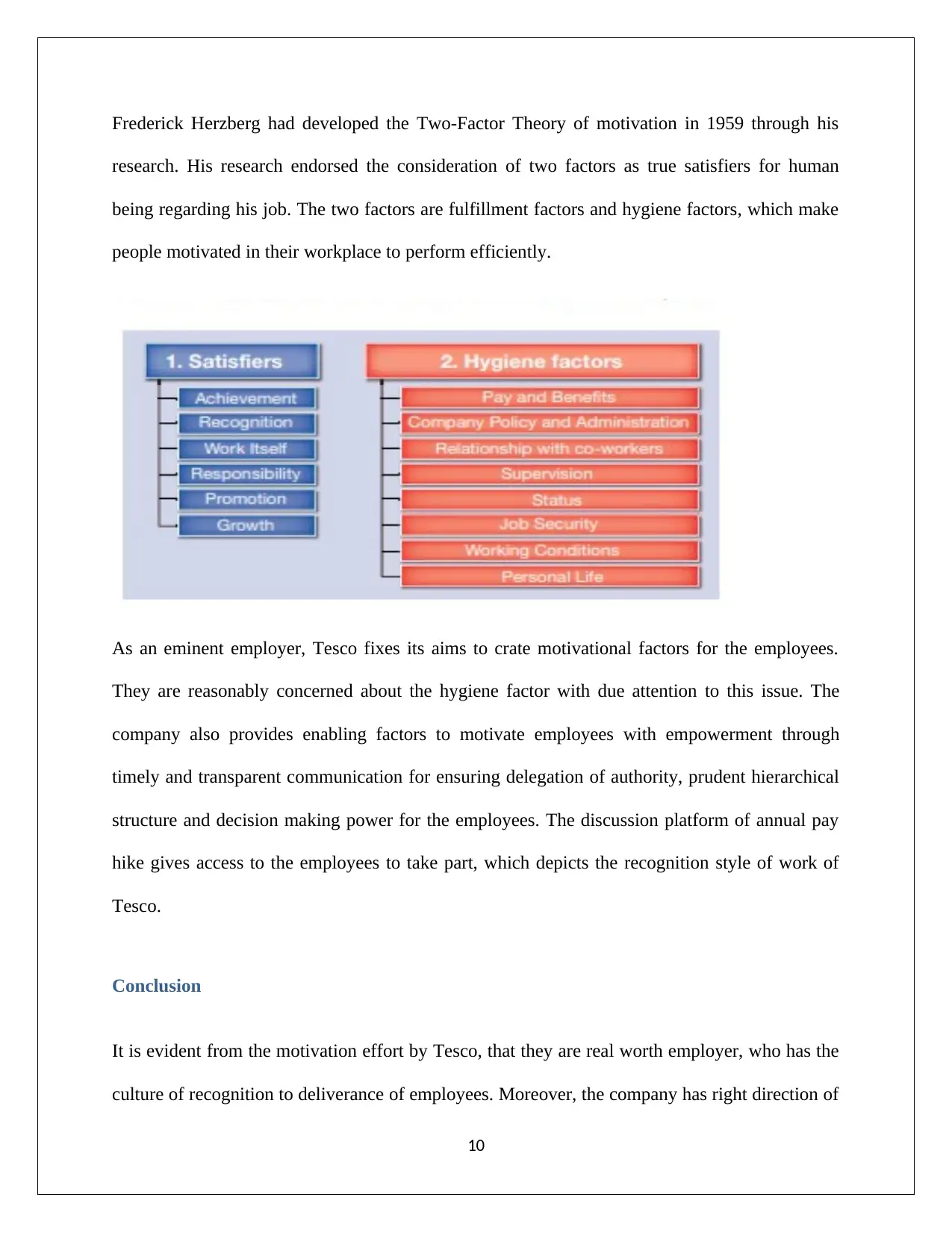
Frederick Herzberg had developed the Two-Factor Theory of motivation in 1959 through his
research. His research endorsed the consideration of two factors as true satisfiers for human
being regarding his job. The two factors are fulfillment factors and hygiene factors, which make
people motivated in their workplace to perform efficiently.
As an eminent employer, Tesco fixes its aims to crate motivational factors for the employees.
They are reasonably concerned about the hygiene factor with due attention to this issue. The
company also provides enabling factors to motivate employees with empowerment through
timely and transparent communication for ensuring delegation of authority, prudent hierarchical
structure and decision making power for the employees. The discussion platform of annual pay
hike gives access to the employees to take part, which depicts the recognition style of work of
Tesco.
Conclusion
It is evident from the motivation effort by Tesco, that they are real worth employer, who has the
culture of recognition to deliverance of employees. Moreover, the company has right direction of
10
research. His research endorsed the consideration of two factors as true satisfiers for human
being regarding his job. The two factors are fulfillment factors and hygiene factors, which make
people motivated in their workplace to perform efficiently.
As an eminent employer, Tesco fixes its aims to crate motivational factors for the employees.
They are reasonably concerned about the hygiene factor with due attention to this issue. The
company also provides enabling factors to motivate employees with empowerment through
timely and transparent communication for ensuring delegation of authority, prudent hierarchical
structure and decision making power for the employees. The discussion platform of annual pay
hike gives access to the employees to take part, which depicts the recognition style of work of
Tesco.
Conclusion
It is evident from the motivation effort by Tesco, that they are real worth employer, who has the
culture of recognition to deliverance of employees. Moreover, the company has right direction of
10
Paraphrase This Document
Need a fresh take? Get an instant paraphrase of this document with our AI Paraphraser
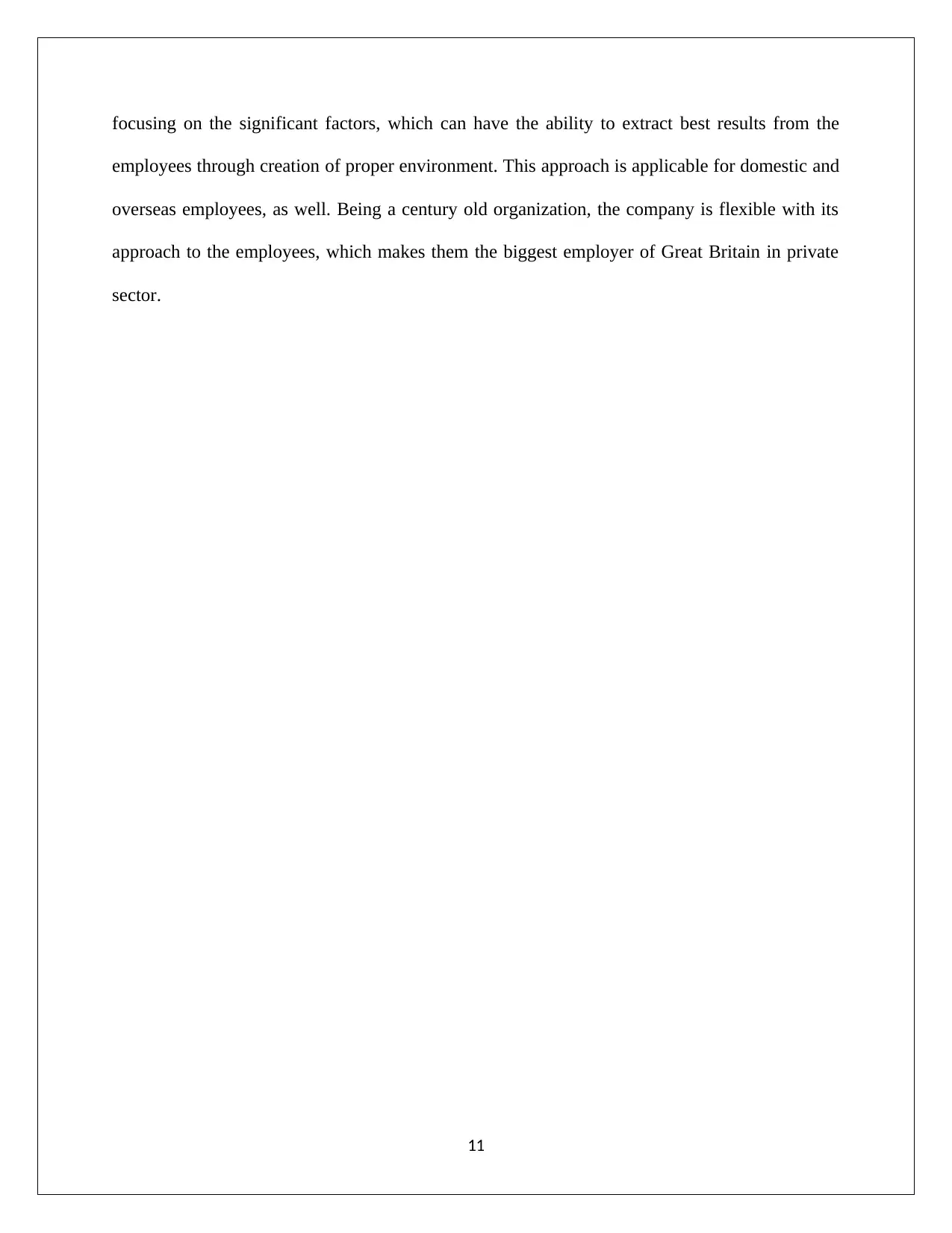
focusing on the significant factors, which can have the ability to extract best results from the
employees through creation of proper environment. This approach is applicable for domestic and
overseas employees, as well. Being a century old organization, the company is flexible with its
approach to the employees, which makes them the biggest employer of Great Britain in private
sector.
11
employees through creation of proper environment. This approach is applicable for domestic and
overseas employees, as well. Being a century old organization, the company is flexible with its
approach to the employees, which makes them the biggest employer of Great Britain in private
sector.
11
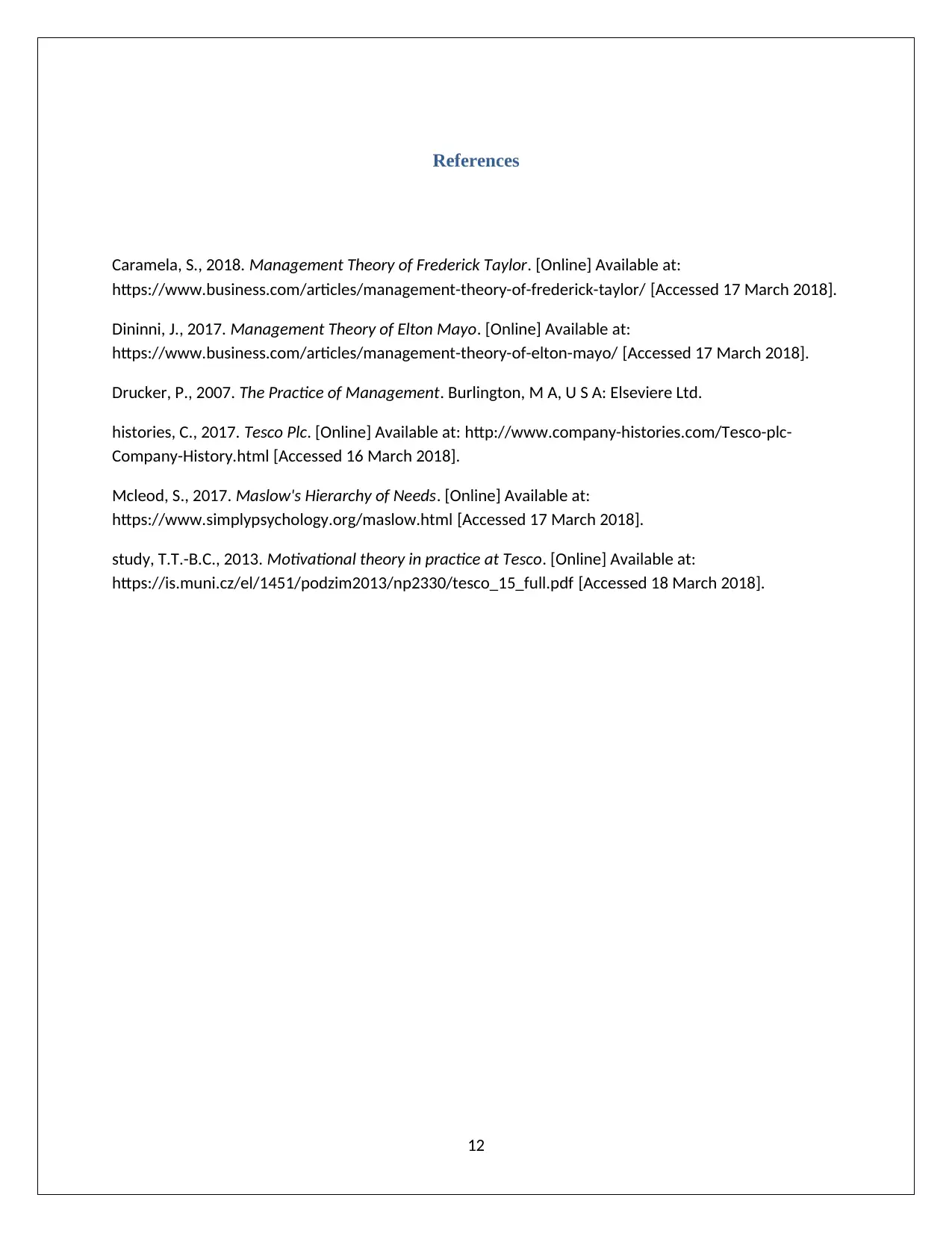
References
Caramela, S., 2018. Management Theory of Frederick Taylor. [Online] Available at:
https://www.business.com/articles/management-theory-of-frederick-taylor/ [Accessed 17 March 2018].
Dininni, J., 2017. Management Theory of Elton Mayo. [Online] Available at:
https://www.business.com/articles/management-theory-of-elton-mayo/ [Accessed 17 March 2018].
Drucker, P., 2007. The Practice of Management. Burlington, M A, U S A: Elseviere Ltd.
histories, C., 2017. Tesco Plc. [Online] Available at: http://www.company-histories.com/Tesco-plc-
Company-History.html [Accessed 16 March 2018].
Mcleod, S., 2017. Maslow's Hierarchy of Needs. [Online] Available at:
https://www.simplypsychology.org/maslow.html [Accessed 17 March 2018].
study, T.T.-B.C., 2013. Motivational theory in practice at Tesco. [Online] Available at:
https://is.muni.cz/el/1451/podzim2013/np2330/tesco_15_full.pdf [Accessed 18 March 2018].
12
Caramela, S., 2018. Management Theory of Frederick Taylor. [Online] Available at:
https://www.business.com/articles/management-theory-of-frederick-taylor/ [Accessed 17 March 2018].
Dininni, J., 2017. Management Theory of Elton Mayo. [Online] Available at:
https://www.business.com/articles/management-theory-of-elton-mayo/ [Accessed 17 March 2018].
Drucker, P., 2007. The Practice of Management. Burlington, M A, U S A: Elseviere Ltd.
histories, C., 2017. Tesco Plc. [Online] Available at: http://www.company-histories.com/Tesco-plc-
Company-History.html [Accessed 16 March 2018].
Mcleod, S., 2017. Maslow's Hierarchy of Needs. [Online] Available at:
https://www.simplypsychology.org/maslow.html [Accessed 17 March 2018].
study, T.T.-B.C., 2013. Motivational theory in practice at Tesco. [Online] Available at:
https://is.muni.cz/el/1451/podzim2013/np2330/tesco_15_full.pdf [Accessed 18 March 2018].
12
⊘ This is a preview!⊘
Do you want full access?
Subscribe today to unlock all pages.

Trusted by 1+ million students worldwide
1 out of 12
Related Documents
Your All-in-One AI-Powered Toolkit for Academic Success.
+13062052269
info@desklib.com
Available 24*7 on WhatsApp / Email
![[object Object]](/_next/static/media/star-bottom.7253800d.svg)
Unlock your academic potential
Copyright © 2020–2025 A2Z Services. All Rights Reserved. Developed and managed by ZUCOL.



